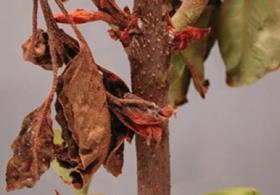
Italian farming organisation CIA has called on the authorities to take prompt action following a reported resurgence in canker cases among kiwifruit trees grown in the region of Lazio, the country's largest producer of green- and yellow-fleshed varieties.
The news comes at a difficult time for the Italian fresh produce trade, which has seen its exports slump during the past year as demand in key markets like Germany has fallen.
'The problem is a worrying one,' one leading marketer of Italian kiwifruit told Fruitnet.com. 'But we hoping we can defend against it.'
According to the CIA, the development of kiwifruit trees in Lazio over the past month has coincided with an upturn in cases of the disease, which is also known as syringae pv. Actinidiae, with the number of trees affected said to be in the thousands.
With hundreds of alerts already received from growers in the region, CIA reported that around 50 per cent of yellow-fleshed varieties have been affected.
But perhaps of even greater concern is the organisation's suggestion that canker is also 'spreading rapidly' among young green kiwifruit plants, which have up until now been regarded as having a greater resistance to the disease.
While the visual impact of the disease – which causes trees to 'bleed' as they die – is shocking enough in itself, the potential loss to Lazio as a region caused by an eventual loss in kiwifruit revenues would be significant.
Worth more than €70m a year, the area's winter-bearing kiwifruit has been a robust performer on international fruit markets during the past few years, retaining its value better as sales of fruits harvested in summer, like peaches and nectarines, have declined.
Alessandro Salvadori, president of the CIA's Lazio branch, said quick action would be necessary in order to minimise the damage caused.
'The regional authorities must intervene immediately and monitor kiwifruit production areas while at the same time ensuring the use of good farming practices that can contain the canker, such as for example the immediate grubbing and burning of affected trees,' he said.



